- Home
- Sharon Kendrick
Kiss and Tell
Kiss and Tell Read online
Three houses, three couples—three reasons for revenge
Letter to Reader
Title Page
CHAPTER ONE
CHAPTER TWO
CHAPTER THREE
CHAPTER FOUR
CHAPTER FIVE
CHAPTER SIX
CHAPTER SEVEN
CHAPTER EIGHT
CHAPTER NINE
CHAPTER TEN
CHAPTER ELEVEN
CHAPTER TWELVE
Copyright
Three houses, three couples—three reasons for revenge
The calm surface of life in St. Fiacre’s Hill—where lavish homes provide a secure haven for the seriously rich—hides a maelstrom of feeling. Geraint Howell-Williams, Triss Alexander and Dominic Dashwood all think they have a need to avenge—but the actions each sets in motion gain a life of their own, with entirely unexpected results.
Kiss and Tell is the second book in Sharon Kendrick’s REVENGE IS SWEET trilogy. Look out for Dominic’s story in Settling the Score (#1957), coming next month.
Dear Reader,
“Revenge is a dish best served cold.”
The above line grabbed my attention the very first time I read it. Revenge is a strong, deep emotion—passion with a dark, sometimes bitter side to it—and I have chosen it as the linking theme for my St. Fiacre’s books.
I like the idea of my characters—all outwardly highly successful people—having a secret side to their natures. A side that can plot to avenge themselves, a side that might sometimes appall them, but that they are powerless to resist—for the darkest emotions are always the most irresistible....
What motivates revenge? It is always the sense of having been wronged, a chance to win after an earlier defeat. And like all deep, controlling passions, revenge has a cumulative effect.
But don’t take my word for it—find out yourself from Geraint, Triss and Dominic....
Sharon Kendrick
SHARON KENDRICK
Kiss and Tell
TORONTO NEW YORK • LONDON
AMSTERDAM • PARIS • SYDNEY • HAMBURG
STOCKHOLM • ATHENS • TOKYO • MILAN
MADRID • WARSAW • BUDAPEST • AUCKLAND
CHAPTER ONE
WOULD he come? That was the question. A question which could only be answered by the man himself, all six feet four of him, with his unruly hair and his Irish eyes and that irreverent humour which always seemed to be lurking at the corners of a mouth just made for kissing.
Triss shivered. She must just be patient, and wait. She had waited fourteen months, after all, so another few minutes were neither here nor there.
In fact, what she should do was to make herself remember why she had split up with Cormack Casey in the first place.
And after that she should force herself to recall every single one of his bad points, so that a miracle might happen and she might remain immune to him.
Some hopes.
The sound of the waves beating down on the wet blond sand outside the cottage rang in her ears. Triss glanced down at her watch and for the twentieth time she wondered how Simon was. She had never been away from her beautiful blue-eyed baby before, and had been totally unprepared for the almost physical pain of his absence.
No one ever warned you what babies would do to you, she thought, with a sudden rush of overwhelming love. How motherhood would change you irrevocably, so that the person you used to be before you had the baby seemed like a distant stranger.
The cottage she had rented had been deliberately chosen for its lack of television and telephone. Cormack was a man whom other people clam-oured to be with. When they had lived together his phone had never stopped ringing—hence the lack of facilities in this out-of-the-way place. But, even more importantly, she wanted all his attention when she dropped her bombshell into his lap.
She had given the number of the local pub to Lola—who was looking after Simon for her—with the instructions that she was to ring Triss immediately if there was anything she wasn’t happy about.
Please God, there wouldn’t be.
She thought of the comfort and security of her elegant house on the exclusive St Fiacre’s Hill estate, bought with the earnings from her successful modelling career. The perfect place, she had decided during her pregnancy, in which to bring up her baby.
Triss swallowed down the ever-present fears which were part and parcel of motherhood and allowed herself a fleeting glance in the mirror, wincing slightly as she did so.
The simple rust-coloured linen dress she had chosen was practical and comfortable, but it made her look so mumsy—and today it seemed to drain all the colour from her skin.
Should she have worn make-up? she wondered.
She had decided against it in the end. Make-up might seem contrived, as though she was trying to focus all Cormack’s attention on her, while nothing could be further from the truth.
Her face was pale—paper-pale—with the freckles which spattered her small snub nose standing out in stark relief. Her green and golden eyes were as big as beacons, but tiny lines of strain, fanning out from the corners, could be seen if you looked closely. Though she doubted that Cormack would be interested in looking closely.
At least she wasn’t holding out any hope that Cormack would attempt to seek some form of reconciliation with her today. She looked a completely different person from the woman he had first met—with her red-brown hair all shorn off, her face completely bare of make-up. And hadn’t Cormack loved the fact that her model-girl looks were so flamboyant that millions of men lusted after her?
Well, she couldn’t imagine anyone lusting after her now...
She heard the distant sound of an engine, and her ears pricked up even as she frowned, trying to work out what made this particular engine sound quite unlike any car she had ever come across. But only one man in the world would drive to a beach in something which sounded like Concorde breaking through the sound barrier!
Cormack!
Triss ran her fingertips beneath her eyes, as if by doing so she could magically remove the dark smudges of so many sleepless nights. Then she bit down hard on her bottom lip so that the blood rushed in to give her mouth some colour.
And waited.
The cottage was right off the beaten track—that had been one of the main reasons for choosing it. The beach made it fairly inaccessible, and you had to park your car right at the top and then clamber down over a low wall before you could walk across the sand to the house.
So how come she could hear the engine getting closer and closer, its loud, buzzing intensity sounding like a giant insect gone mad?
Triss flung the front door open and saw the sleek black and silver machine which was noisily growling its way to a halt right in front of the cottage, sludging up the pale, hard sand as it did so.
Trust Cormack to hire himself a motorbike, she thought, torn between exasperation and admiration. It had been one of the things which had both attracted and infuriated her—the fact that Cormack Casey was like no other man in the world.
The man in question was now pulling off an outrageous silver and scarlet crash-helmet, and Triss held her breath to see whether he had adopted a more sober and sensible hairstyle which might better reflect his reputation as Hollywood’s hottest, sharpest and hunkiest scriptwriter.
He hadn’t!
And Triss was unprepared for the relief which flooded through her as she caught sight of that magnificent mane of dark hair which grew down the tanned column of his neck. Too long and too tousled, it gleamed blue-black beneath the pale light of the March sun, with its riotous waves looking as though some frantic woman had just run her fingers all the way through it.
Triss swallowed down the dark, bitter taste of jealousy and looked into
eyes as deeply blue as the finest lapis lazuli. Simon’s eyes, she thought suddenly, with the shock of recognition.
‘Hello, Beatrice,’ he said unsmilingly, and his voice sounded at once strange and yet poignantly familiar.
The Irish accent, she noted, was still intact, though now it held the faintest trace of a soft Mid-Atlantic twang. Hardly surprising, Triss supposed, seeing as how he had been living in the States since the age of sixteen.
‘Hello, Cormack,’ she said, her own voice sounding reedy and weak—but that was hardly surprising either. She had been unprepared for the impression he always made on her, and that was sheer stupidity. How on earth could she have forgotten just how devastating he was in the flesh?
He was dressed from head to toe in black leather. A leather jacket clung to shoulders as broad as a labourer’s and then tapered down to the curved indentation of his waist, and below the jacket were leather jeans—black and outrageously snug, the soft material caressing the muscular definition of his thighs, and on and on down his seemingly endless legs.
Leather, thought Triss despairingly. That most sensual of fabrics, with its sleek look and slick feel and its exciting, animal scent.
Those intelligent blue eyes didn’t miss a trick. He observed her gaze wandering, hypnotised, over every centimetre of his body. ‘Like it?’ he queried softly.
‘What?’ she whispered.
‘The leather.’ His eyes glittered. ‘Some women find it a turn-on.’
‘Is that why you wore it?’
‘I’m not sure. Perhaps subconsciously?’
‘You look like a labourer,’ she said sweetly. ‘Or a degenerate rock star.’
The first smile came then—a typically roguish Cormack-type smile—and Triss was unprepared for its impact. Stupidly unaware that the sight of it would set her heart racing as it had done so many times before. Damn him! she thought indignantly. He knows. He knows what that smile can do to a woman. And it’s an unfair advantage!
‘Well, that’s appropriate, isn’t it?’ he drawled. ‘As I’ve been both a labourer and a rock star. Though never degenerate.’ There was a long pause while he studied her. ‘You’ve had your hair cut, Triss,’ he said eventually, and there was an odd note of surprise in his voice.
Triss had been holding her breath, waiting for all the comments he could have made, and felt oddly disappointed that Cormack, of all people, should have said something so commonplace.
For the first time she felt a glow of something approaching achievement—that she had had the strength to remove the trademark which had eventually trapped her. ‘Yes,’ she agreed evenly. ‘All chopped off.’
‘When?’ he demanded, as though she were a suspect he was cross-examining.
This was a touch more difficult—she had had her thick red-brown hair shorn on the day she had discovered she was pregnant. It had seemed a very symbolic and necessary thing to do at the time. She gave a careless little shrug. ‘Can’t remember,’ she lied.
The blue eyes narrowed disbelievingly. ‘Really? Can you remember why you did it?’
Triss managed to return his hard, questioning stare. ‘Why shouldn’t I cut it? Models often change their image—’
‘But you don’t model any more, do you, Triss?’
Her eyes widened. How much, she wondered anxiously, did he already know? ‘Wh-what do you mean?’
He frowned. ‘Good God, woman—has your brain gone to mush, or are my questions so complex that I’m going to have to clarify each and every one?’
“There’s no need to be so sarcastic!’ Triss shot back furiously, remembering how his razor-sharp mind had always been able to make her feel so ridiculously inferior. But no more. No more. ‘Is there?’
‘No.’ He gave her a steady look. ‘OK, I presume that you’ve given up modelling—mainly because I never see you in any of the glossies these days. And you certainly aren’t very visible on the catwalk. Are you?’
Had he perhaps been following her career? Hope stirred foolishly in her heart, but Triss firmly repressed it. ‘No. That’s right. I’m not modelling these days.’
Arrogant black brows which looked as though an artist had swept them on darkly and indelibly against that high, intelligent forehead curved upwards in bemused question. ‘And why’s that? You were the best model of your generation.’
Trust Cormack, thought Triss in some alarm. He had always had the knack of getting to the point without any effort whatsoever. Give him a couple more minutes and he would have extracted her reason for inviting him here, and that was not her plan at all!
She did not intend to blurt anything out. Not now—not on the doorstep with a bitter March wind blowing up a storm around them.
She had planned it out so carefully in her mind. They were supposed to have a civilised period chatting together. A reacquaintance over the simple lunch she had prepared. Something calm and unemotional which befitted modern, enlightened exlovers who knew all the rules of the dating game. Before she dropped her bombshell.
‘Why don’t we go inside?’ she suggested quickly. ‘It’s warmer in there. The kettle is on the boil, and I’m making some soup.’ She cast up her eyes expressively at the oyster-grey sky. ‘It looks like soup kind of weather, doesn’t it?’
‘It sure does.’ His mouth moved in a sardonic twist, and he said nothing more as he followed her inside, but Triss could guess what he was thinking.
In the days when they had lived together Triss had scarcely known one end of a kettle from another. And their relationship had never progressed beyond the tempestuous passion stage to the living in relative harmony stage.
How people changed, she reflected as Cormack walked into the sitting room, shutting the front door behind him. Well, she had certainly changed—she had had to—but had Cormack?
‘You’ve lit a fire,’ he observed in surprise as he placed his helmet on the floor beside one of the armchairs and began to unzip his black leather jacket.
‘Yes.’ For the first time, humour danced in her hazel eyes.
‘And what’s so funny?’ he murmured casually, though his blue eyes were very watchful.
‘You,’ she answered without thinking. ‘Making all these conventional observations. It doesn’t sound like you at all, Cormack.’
‘And Triss Alexander lighting fires and boiling kettles and concocting soups—that doesn’t sound like you at all, either. So what do you think that says about us, hmm?’
Triss shrugged. ‘I’ll leave all the deductions to you, I think,’ she answered brightly. ‘After all, that’s what you’re good at.’
‘But I thought that you were the queen of jumping to conclusions,’ he parried softly. ‘After all, I only had to speak two words to a woman and everyone knew that I must be sleeping with her, didn’t they, Triss?’
His caustic words brought back the aching and humiliating memories of sexual jealousy, and Triss felt all the remaining colour drain from her cheeks.
Was she setting herself up for more of the same? The same kind of limbo she’d used to live in constantly when she was with Cormack? She had hated the person she’d eventually become—with her checking and counter-checking and her suspicions about him. Her insane jealousy had appalled both her and him, and yet she had been powerless to change her behaviour.
She drew in a deep breath. She had not brought Cormack here today to resurrect old battles. She was a mother now, and a responsible grown-up woman of twenty-four. She must lead by example, and surely if she was calm and mature and remained unruffled, then Cormack might behave likewise? ‘Are you hungry?’ she asked politely.
The ironic twist of his mouth acknowledged her formality as he sank down into the armchair nearest the fire, his leather clothes making little swishing sounds as the fabric moved in conjunction with his big, muscular limbs. ‘Starving,’ he admitted. ‘But I need a drink first.’
Triss was startled. She thought about the supplies she had brought with her. One bottle, and she wasn’t even sure if there was a cork
screw in the place. ‘I have wine,’ she told him rather hesitantly. ‘But that’s all.’
‘I meant tea, actually,’ he said, with a disbelieving little look at the grandfather clock which ticked loudly in one corner of the over-furnished room. ‘Goodness me, Triss,’ he murmured admonishingly. ‘Offering me alcohol before midday—what degenerate circles you must have been mixing in!’
If only he knew! ‘I’ll make a pot,’ she said stiffly, and headed off into the kitchen where she welcomed the chance to busy herself with kettle and cups and saucers. The activity stopped her from thinking too much, and she willed her hands to stop trembling, but they steadfastly refused to obey her.
He had not moved when she carried the loaded tea-tray back in and the sight of him in that tiny, old-fashioned room, all brooding masculinity and black leather, conjured up the image of something both sensual and forbidden.
With his gleaming blue eyes and devil-may-care air, Cormack Casey looked the embodiment of the kind of man most mothers warned their daughters against.
Unless you happened to have a mother like hers, thought Triss bitterly, who fancied Casey rotten herself and had delighted in enlightening Triss as to what kind of man he really was.
‘Here.’ He had gracefully risen to his feet and was holding his hands out. ‘Let me take that from you.’
Triss blushed, knowing that she was at her most vulnerable when he was gentle to her. ‘It’s OK, thank you. I can manage.’
‘But it’s heavy, sweetheart—here.’ And he captured the tray from her with ease. ‘Sit down,’ he instructed. ‘And stop glowering at me like that.’
Glowering was her only defence against being called ‘sweetheart’ in that irresistibly lilting Irish way of his. She was trying all the while to tell herself that the affectionate term meant nothing—nothing at all. It was a phrase people used all the time in Belfast.

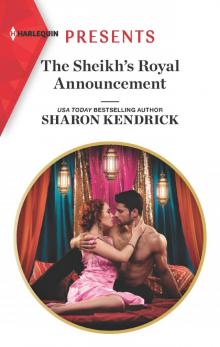 The Sheikh's Royal Announcement
The Sheikh's Royal Announcement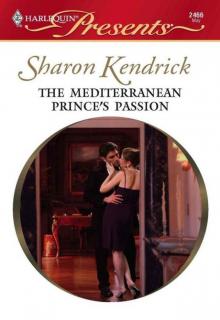 The Mediterranean Prince's Passion (The Royal House 0f Cacciatore Book 1)
The Mediterranean Prince's Passion (The Royal House 0f Cacciatore Book 1) Bought Bride For The Argentinian (Conveniently Wed!)
Bought Bride For The Argentinian (Conveniently Wed!)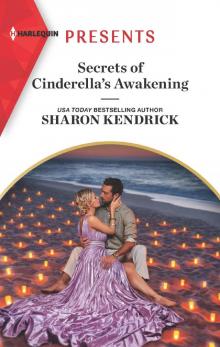 Secrets of Cinderella's Awakening
Secrets of Cinderella's Awakening His Contract Christmas Bride
His Contract Christmas Bride One Night Before The Royal Wedding (Mills & Boon Modern)
One Night Before The Royal Wedding (Mills & Boon Modern) Cinderella's Christmas Secret (Mills & Boon Modern)
Cinderella's Christmas Secret (Mills & Boon Modern) Cinderella In The Sicilian's World (HQR Presents)
Cinderella In The Sicilian's World (HQR Presents) The Argentinian's Baby Of Scandal
The Argentinian's Baby Of Scandal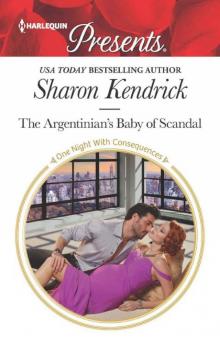 The Argentinian's Baby 0f Scandall (One Night With Consequences)
The Argentinian's Baby 0f Scandall (One Night With Consequences) Kat And The Dare-Devil Spaniard (The Balfour Brides Book 2)
Kat And The Dare-Devil Spaniard (The Balfour Brides Book 2) The Prince's Love-Child (The Royal House 0f Cacciatore Book 2)
The Prince's Love-Child (The Royal House 0f Cacciatore Book 2) His Contract Christmas Bride (Conveniently Wed!)
His Contract Christmas Bride (Conveniently Wed!)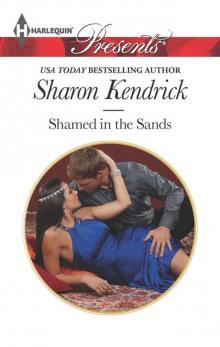 Shamed in the Sands
Shamed in the Sands The Sheikh’s Secret Baby
The Sheikh’s Secret Baby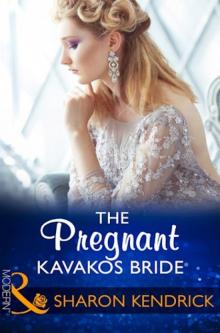 The Pregnant Kavakos Bride
The Pregnant Kavakos Bride The Italian's Love-Child
The Italian's Love-Child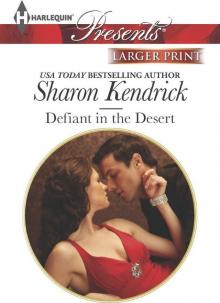 Defiant in the Desert
Defiant in the Desert Desert Jewels & Rising Stars
Desert Jewels & Rising Stars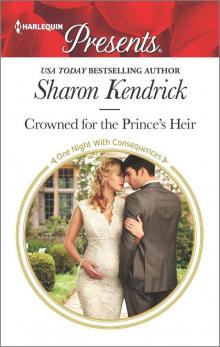 Crowned for the Prince's Heir
Crowned for the Prince's Heir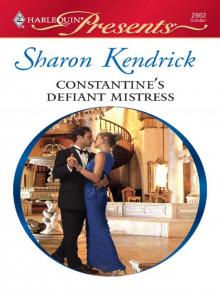 Constantine's Defiant Mistress
Constantine's Defiant Mistress Sexy Sheikh Bundle (Harlequin Presents)
Sexy Sheikh Bundle (Harlequin Presents)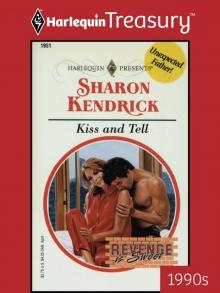 Kiss and Tell
Kiss and Tell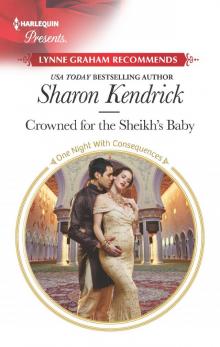 Crowned for the Sheikh's Baby
Crowned for the Sheikh's Baby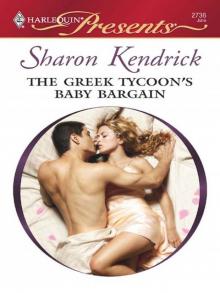 The Greek Tycoon's Baby Bargain
The Greek Tycoon's Baby Bargain The Forbidden Innocent
The Forbidden Innocent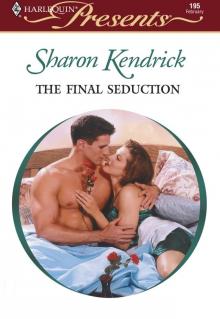 The Final Seduction
The Final Seduction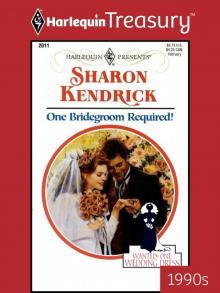 One Bridegroom Required!
One Bridegroom Required!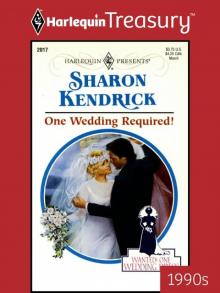 One Wedding Required!
One Wedding Required!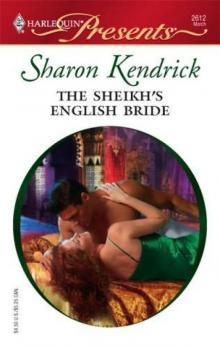 The Sheikh's English Bride
The Sheikh's English Bride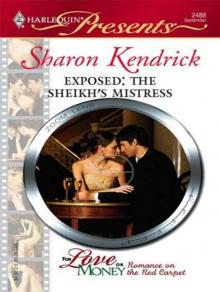 Exposed The Sheikh’s Mistress
Exposed The Sheikh’s Mistress A Royal Vow of Convenience
A Royal Vow of Convenience The Sheikh's Christmas Conquest
The Sheikh's Christmas Conquest The Housekeeper's Awakening
The Housekeeper's Awakening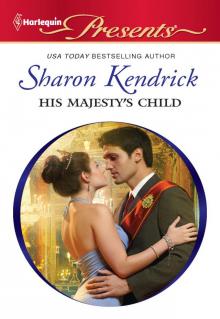 His Majesty's Child
His Majesty's Child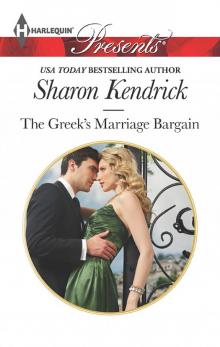 The Greek's Marriage Bargain
The Greek's Marriage Bargain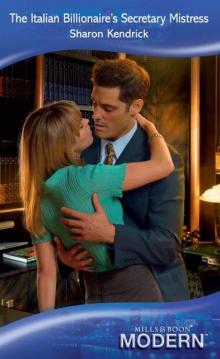 The Italian Billionaire's Secretary Mistress
The Italian Billionaire's Secretary Mistress Shameful Secret, Shotgun Wedding
Shameful Secret, Shotgun Wedding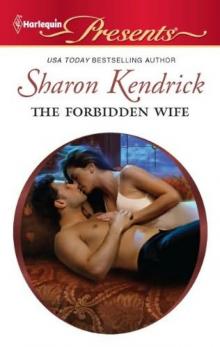 The Forbidden Wife
The Forbidden Wife Desert Princes Bundle
Desert Princes Bundle Bedded for revenge
Bedded for revenge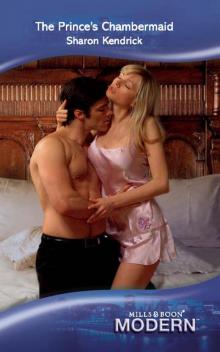 The Prince's Chambermaid
The Prince's Chambermaid The Italian's Christmas Housekeeper
The Italian's Christmas Housekeeper The Sheikh’s Heir
The Sheikh’s Heir The Desert Prince's Mistress
The Desert Prince's Mistress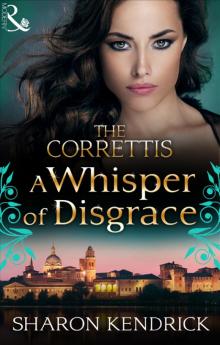 A Whisper of Disgrace
A Whisper of Disgrace Surrender to the Sheikh (London's Most Eligible Playboys Book 2)
Surrender to the Sheikh (London's Most Eligible Playboys Book 2)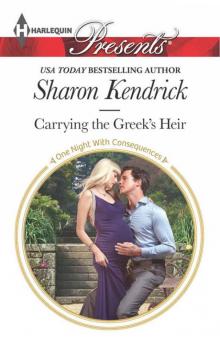 Carrying the Greek's Heir
Carrying the Greek's Heir Christmas in Da Conti's Bed
Christmas in Da Conti's Bed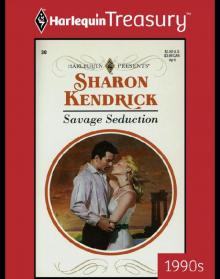 Savage Seduction
Savage Seduction A Scandal, a Secret, a BabyMarriage Scandal, Showbiz Baby!
A Scandal, a Secret, a BabyMarriage Scandal, Showbiz Baby!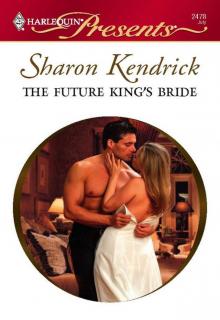 The Future King's Bride
The Future King's Bride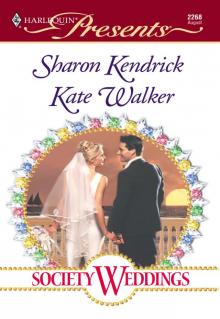 Society Weddings
Society Weddings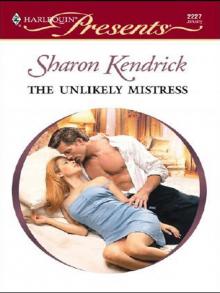 The Unlikely Mistress
The Unlikely Mistress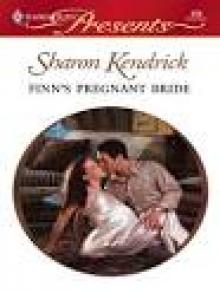 Finn's Pregnant Bride
Finn's Pregnant Bride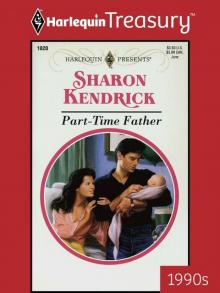 Part-Time Father (Harlequin Presents)
Part-Time Father (Harlequin Presents)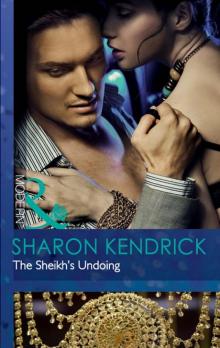 The Sheikh's Undoing
The Sheikh's Undoing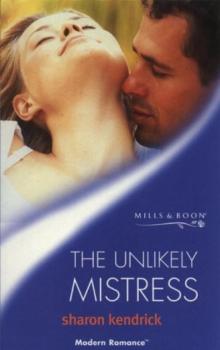 The Unlikely Mistress (London's Most Eligible Playboys #01)
The Unlikely Mistress (London's Most Eligible Playboys #01)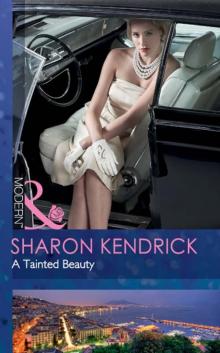 A Tainted Beauty
A Tainted Beauty Surrender to the Sheikh
Surrender to the Sheikh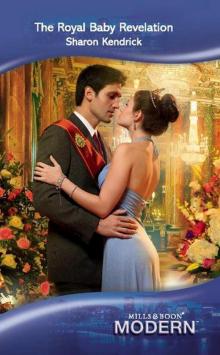 The Royal Baby Revelation
The Royal Baby Revelation The Greek's Bought Bride
The Greek's Bought Bride The Sicilian's Passion
The Sicilian's Passion Happy Mother's Day!
Happy Mother's Day! Di Sione's Virgin Mistress
Di Sione's Virgin Mistress The Italian's Christmas Secret
The Italian's Christmas Secret Secrets of a Billionaire's Mistress (Mills & Boon Modern) (One Night With Consequences, Book 29)
Secrets of a Billionaire's Mistress (Mills & Boon Modern) (One Night With Consequences, Book 29) The Sheikh's Bought Wife
The Sheikh's Bought Wife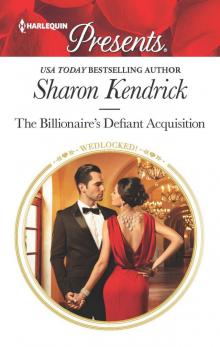 The Billionaire's Defiant Acquisition
The Billionaire's Defiant Acquisition Seduced by the Sultan
Seduced by the Sultan Playing the Greek's Game
Playing the Greek's Game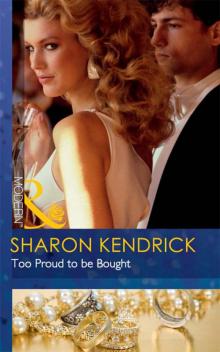 Too Proud to be Bought
Too Proud to be Bought Back in the Headlines
Back in the Headlines Bound to the Sicilian's Bed
Bound to the Sicilian's Bed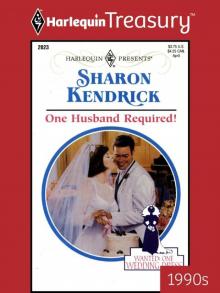 One Husband Required!
One Husband Required!